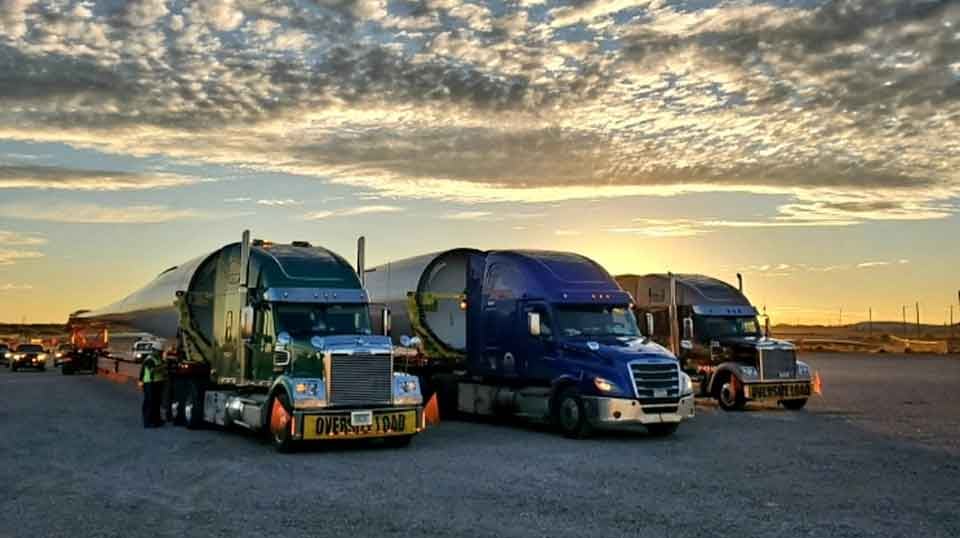
In any business, understanding pricing is critical. Is it okay to go with the cheapest option, or will that cause more problems down the road? Why is the price from last week different from the price today? And why is everything so dang expensive?
Unfortunately, we can’t help you with that last one (we wonder the same thing). But at least when it comes to trucking services, we can help you understand what drives the price of your load, why it varies each time and what causes variances between carriers.
At Anderson Trucking Service (ATS), we’ve been in the industry since 1955. Over that time, we’ve learned a lot about pricing — both from our process and from our customers and competitors.
Today, we’ll dive into all aspects of pricing in the trucking industry — how it’s determined, why it varies, and what it means. This information will help you secure a fair price for your next shipment.
How Supply and Demand Impact the Trucking Industry
Like many industries, prices in trucking are based on supply and demand.
- If there are more trucks available than loads, prices will be lower as trucks compete for freight.
- If there are more loads available than trucks, prices will be higher as freight competes for trucks.
That’s the easiest answer for how prices are set for shipping. Of course, there are multiple other variables that will determine the cost of each shipment.
Why Does the Price of Freight Shipping Vary Between Carriers?
Different transportation carriers may have varying prices for the same load. There’s no one reason for these differences, but many variables each company considers.
- Location. If the carrier has a local hub, the cost to get the truck to the origin will be lower.
- Driver availability. When the carrier has one or more drivers available looking for freight, they may provide a discount to get those drivers back on the road.
- Specialty. The price may vary based on the type of truck needed and how many of that type of vehicle the carrier has available.
- Overhead. Companies that have less overhead (they may have a smaller fleet, smaller trucks that require less maintenance or less office support) might pass that savings on to you.
Many of these variables between carriers will also vary from day to day with the same carrier. Just because a specific carrier had the lowest price last time doesn’t mean they will every time.
In fact, there’s never a guarantee with cost between carriers, or even between identical-seeming loads. The Freight Carrier Selection Checklist can help you compare options, or read on to learn more about pricing in the trucking industry.
Why Does the Price for the Same Freight Vary?
Even with the same carrier, you may find that an identical load is priced differently than it was last time. The short answer for why that happened is supply and demand, but there are some other variables that the companies use to set pricing.
- Fuel costs. The price of fuel fluctuates by the week and by the day. While you may or may not notice this at the pump, transportation companies definitely notice this difference when they fill up a 53-foot truck with a 100-gallon gas tank. Companies adjust pricing accordingly.
- Seasonal fluctuation. Every company has slower and busier periods. During slower periods, they may lower the price of a haul to keep drivers on the road and money coming in. When the market adjusts, so will prices.
- Destination. When a driver wants to get home, their driver manager will work to get them as close to their destination as possible. If your load happens to get a driver close to home when they want time off, they may be willing to drive for a lower rate.
- Contract vs spot rates. Your shipping rate may vary based on whether you have a contracted price or rely on spot quotes. Contract prices are set ahead of time, and spot quotes reflect what’s happening today. One may be higher or lower depending on what’s happening in the market.
- Accessorial charges. Surcharges added after the rate is discussed are called accessorial charges. If one load has special needs like detention, tarping or stop charges, that may be reflected in the final price.
Even frequent shippers may not be able to predict the pricing for each load. The best method is to contact your provider with your request and find out what they say.
How External Factors Drive the Price of Shipping
Sometimes, the cost of trucking services is set by factors beyond the control of the transportation provider or the driver. These external factors will often temporarily increase the price consumers pay.
Natural Disasters
Large-scale disasters, like hurricanes or floods, require truckloads of goods during the recovery process — everything from construction equipment to clean-up supplies to humanitarian freight.
Getting these critical resources to the right location requires a lot of trucks and drivers. And because the early days of disaster recovery are so chaotic, recovery requires that they spend a lot of time waiting in staging areas while waiting to be directed to the ultimate destination.
While no one wants natural disasters to occur, they do result in elevated pricing while trucks prioritize helping with the recovery efforts.
Natural disasters can also cause widespread road closures. Of course, there are a variety of other reasons roads may be closed.
Road Construction
Road construction can add miles, time and expenses, impacting the price you pay to move that load. It may be impossible to completely avoid road construction, which can cause price fluctuations on a day-by-day basis.
All infrastructure, whether or not it impacts the driver’s route, requires an abundance of goods that are delivered on trucks.
Local Construction Market
Housing development, road projects and the commercial construction of offices, restaurants and retail stores all require a massive amount of freight to complete — forklifts and scissors lifts, rafters and drywall, lighting and HVAC equipment, the list goes on. These projects can impact the trucking supply and demand in that specific area.
In the northern part of the country, outdoor construction is halted by cold temperatures, frozen ground and snow. When cold weather sets in, the need for trucks carrying construction freight into that market reduces greatly, which can impact the availability of vehicles locally.
Construction isn’t the only thing impacted by winter weather. Storms and poor road conditions all winter long can impact the industry in multiple ways.
Weather Delays
No matter where you are in the country, you are impacted by winter weather. When trucks encounter snowy and icy roads, they slow down or stop.
This causes a cascade effect — the truck bringing your freight from the north is delayed to your location, which delays them to their next location, and on and on. A severe storm, no matter where it happens, can cause delays across the country.
A storm that lasts several days will cause a noticeable blip as deliveries take a bit to recover — and the formerly snowed-in need to restock everything they used during the storm.
Drivers have to keep an eye on the weather and the news as they plan their routes.
Political Instability
While most trucking companies are private entities, they are impacted by political forces. War and political unrest can actually cause a spike in transportation prices as munitions and supplies are needed in new locations.
Government shutdowns, while having minimal direct impact on the price of shipping, can have a downstream effect as everyone who depends on the government for income (both individuals and companies) has to cut their budget.
Most of the variables we’ve discussed so far come with some degree of unpredictability. Sometimes, freight costs change due to predictable events, like holidays.
Holidays
Holidays, with their festive decor and gifts and food, increase competition for trucks. Stores are eager to have the hot new item delivered to as many locations as possible, and consumers flood to those stores to purchase as much as possible.
There’s a broad definition of “holiday” in this context. In addition to traditional holidays with their trappings (Christmas gifts, Halloween costumes, Valentine’s Day candies and flowers), dates like electronics releases can cause at least a short-term spike in the market.
Conversely, the period after holidays tends to be slower in the industry and more affordable as the trucks are competing for less freight. If your highest priority is paying an efficient price per shipment, you may be able to achieve that early in the calendar year.
Knowing these variables will help you prepare for price fluctuations throughout the year. Of course, the best pricing may come from comparing multiple providers for the same shipment.
How to Compare Trucking Companies
Just as every load is unique, so is every trucking company. When finding the right carrier for your freight, consider multiple factors. The Freight Carrier Selection Checklist is a great tool for a full comparison, or consider the top variables:
Experience
Not all trucking companies are created equal. That also applies to freight and drivers.
Before engaging a trucking company, be sure they have experience handling freight like yours. Think of the specific situations that will benefit from experience and knowledge:
- Maintaining temperature control logs for reefer freight
- Hauling over-dimensional freight through multiple states, which each require a separate permit
- Balancing the weight of high-density items in a dry van
- Tarping during rain
These are just some of the specialized tasks that drivers encounter on a regular basis. Before trusting your important assets to a transportation carrier, make sure they are ready to meet your needs.
Availability
You need a carrier who has the equipment you need available on the dates you need it. If a trucking company isn’t able to move your loads within your deadlines, it’s time to look at other options.
When it comes to availability, it often pays to be flexible. Offering a window of pick-up and delivery times rather than a strict appointment may mean a better price for you as more units become available.
A transportation provider may be able to meet your deadlines with a comparable vehicle type — for example, agreeing to a hot-shot trailer rather than a flatbed, or a Conestoga trailer instead of a dry bed.
But there are some times when the company with the most experience and the best availability doesn’t make sense with your budget.
Price
This is the real world, and you have a budget you need to meet. Price should definitely be one of the factors you consider when choosing a transportation provider.
Considering price is not the same as choosing the cheapest option. Choosing the cheapest option can end up costing more in the long run. But when comparing similar service levels, definitely use the lever of price to choose the carrier for your freight.
How Do I Get the Best Price on My Next Freight Shipment?
We’d love to tell you that you only need one trucking company and ATS is it. But that’s not the whole story. Understanding what that price means, and the advantages of working with multiple carriers, will help you secure the best price (even if it’s not the lowest).
Using our Transportation Provider Scorecard can help you maximize any shipment.
If you’re looking for a quote today, contact ATS. Our team takes pride in providing accurate, fair pricing.




